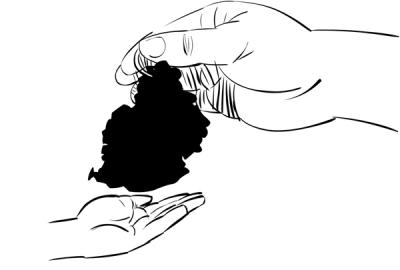In a political context where there is a dissonance between the private persona and the public persona of many of our political leaders. In the context where the key players construct their public identity around childish trinkets, a car, a watch, or worse, in their 50s and 60s still hide behind their father, we need our thought leaders and cultural activists to rise now more than ever. The pendulum swung this way in December, it is starting to move back …
Thought leaders and artists are the architects of the soul of a country. They are often and wrongfully accused of being anti-establishment. It is more complex than that. Most of us take a critical look at establishments because we wish to see evolutionary change take place at a faster pace towards a vision of: an improved society, how to be a better human being, a more compassionate relationship to the other, better ways of managing the city, an ethical nurturing relationship with nature.
Identity
Thought leaders and artists produce by means of reaching out to the other, by means of discovering and making sense of the world. The more we know this world, the better we can love it and situate ourselves in it. It is of course to our advantage today that our children are connected to the global village through a panoply of electronic devices. But it is important that they retain a sense of connection with what it means to be from Mauritius, what it means to be from an island in the Indian Ocean. It is self-knowledge that gives us the confidence to relate to the other with tolerance and compassion, without a sense of threat. While it is important to continue to nurture our varied roots in other parts of the world, it is equally important to nurture what we have created and are in the process of creating here. One does not preclude the other. Artists often dismantle binary thinking in myriad ways.
Environmental ethics
At a recent conference that I attended on the environment in Mauritius while the experts were discussing a number of conflicting technical solutions, a participant pointed out that: If you manage to positively influence the imaginary, then the rest is mere detail. And this is where artists have a huge role to play as cultural catalysts, in positively influencing that mental space and disposition from which we create and recreate. Didactic texts of course contribute to raising awareness about environmental issues, but cultural artifacts, by capturing our children’s imagination, make a deep dent into the mental and emotional space and can help them develop a sense of responsibility towards the planet. Good art wields the power to force children and adults out of their comfort zone.
Intrinsic v/s Extrinsic
While the dreams of a high-income economy run high we cannot open a newspaper without being outraged or depressed by the social issues that assail us. Our sociologists tell us that we are jeopardising the next generation of children by replacing intrinsic input into their lives (i.e. time, attention, support, a listening ear) with extrinsic input (material comforts, electronic gadgets, expensive schooling).
Whatever happened to that good old-fashioned bedtime connection between a parent and a child through story telling or reading? That privileged medium through which a transfer of knowledge, the awakening of curiosity, the asking of questions with and without answers, the exchange of affection and tenderness all take place simultaneously?
Investing in the next generation
Unless we kill complacency, complacency will kill us. We can no longer pat the State on its shoulders and say thank you for providing us with free and compulsory education. We have every right to demand that our children be given a new model of education that will prepare them for the challenges that await them in an increasingly globalised and competitive world.
The biggest challenge the next generation will face is how they decide to use and conserve the earth’s dwindling resources of energy, water, land. To thrive, they will need new sets of skills and competencies. What the world of tomorrow needs is not children who can recite by heart useless information that is already available on the internet. Rather we need to release their innovative potential and their problem-solving skills. We will need children who can transform adversity into opportunity, young adults trained to create clever, ethical, sustainable solutions to everyday problems. We will need to find means of turning our children from voracious consumers to creative producers. Beyond the engineers, doctors, teachers, we will need an army of social entrepreneurs with a deep passion to make a difference in their communities.
Conclusion
I am increasingly convinced that there are only two things worth ever giving to our children: the first one being unconditional love, and the second, an education that encourages them to perpetually surpass themselves, to fly further than they have thought possible.
In the absence of a political discourse that: (1) is authentic and not two-faced; (2) inspires us towards a holistic vision of progress beyond the high-income economy bandwagon; (3) invests smartly into our children, the onus is on thought leaders and artists to act as cultural catalysts.
WHY THOUGHT LEADERS AND ARTISTS ARE CULTURAL CATALYSTS : Towards a discourse of authenticity
- Publicité -
EN CONTINU ↻



